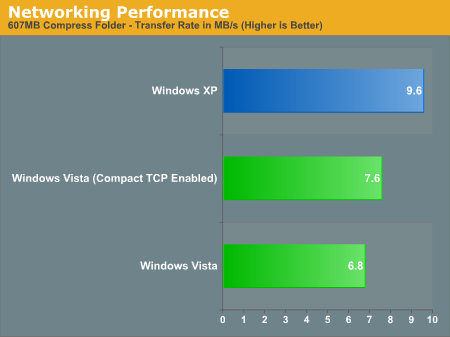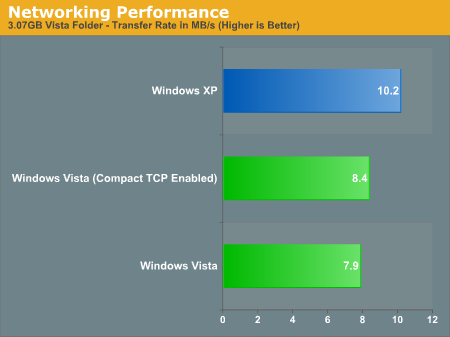Networking Benchmarks
Just to get a quick idea of what these new features can do, we ran our usual networking benchmark suite on a pair of ASUS P5B-Deluxe motherboards using both the on-board PCI and PCIe connected gigabit network controllers (Marvell 88E8056 and 88E8001 respectively). We used two tests for this, a multiple small file transfer test consisting of about 450 files totaling 600MB, and a large file transfer test consisting of a pair of ISO images totaling 3GB. In order to keep the load on our D-Link Gamer Lounge router consistent, we also had the WMV-HD version of Terminator 3 streaming in the background. We tested Windows XP SP2 for a base score, followed by Vista with Compound TCP switched on and off.


Unfortunately for Vista, neither test is particularly favorable. Compared to XP when Compound TCP is disabled, Vista is anywhere between 25% and 50% slower than XP in terms of the total time required for these tests. Without the ability to separate Vista's networking stack from the drivers for our NICs, it's impossible to tell if this slowdown is the fault of the networking stack being worse for this situation, or if the Vista drivers for this line of Marvell NICs are not quite as tuned, so as a comparison to XP this test is inconclusive. Either way, for this particular setup Vista ends up being slower at file transfers than XP.
The one bright spot however is that when enabled, Compound TCP is clearly having some effect even on our low-latency network. The 5% or so boost in Vista's low scores won't bring it back above XP, but it clearly proves that Compound TCP does have a real-world effect on performance. This will be something we will be able to talk more about as Microsoft perfects this algorithm set for the release of Longhorn Server later this year. Hopefully, the relatively slow performance we're seeing right now is being caused by drivers rather than by Vista's "new and improved" networking stack. We will definitely keep an eye on networking performance over the coming months, as most of the people we've talked with expected Vista's networking performance to be faster than XP's.
Just to get a quick idea of what these new features can do, we ran our usual networking benchmark suite on a pair of ASUS P5B-Deluxe motherboards using both the on-board PCI and PCIe connected gigabit network controllers (Marvell 88E8056 and 88E8001 respectively). We used two tests for this, a multiple small file transfer test consisting of about 450 files totaling 600MB, and a large file transfer test consisting of a pair of ISO images totaling 3GB. In order to keep the load on our D-Link Gamer Lounge router consistent, we also had the WMV-HD version of Terminator 3 streaming in the background. We tested Windows XP SP2 for a base score, followed by Vista with Compound TCP switched on and off.


Unfortunately for Vista, neither test is particularly favorable. Compared to XP when Compound TCP is disabled, Vista is anywhere between 25% and 50% slower than XP in terms of the total time required for these tests. Without the ability to separate Vista's networking stack from the drivers for our NICs, it's impossible to tell if this slowdown is the fault of the networking stack being worse for this situation, or if the Vista drivers for this line of Marvell NICs are not quite as tuned, so as a comparison to XP this test is inconclusive. Either way, for this particular setup Vista ends up being slower at file transfers than XP.
The one bright spot however is that when enabled, Compound TCP is clearly having some effect even on our low-latency network. The 5% or so boost in Vista's low scores won't bring it back above XP, but it clearly proves that Compound TCP does have a real-world effect on performance. This will be something we will be able to talk more about as Microsoft perfects this algorithm set for the release of Longhorn Server later this year. Hopefully, the relatively slow performance we're seeing right now is being caused by drivers rather than by Vista's "new and improved" networking stack. We will definitely keep an eye on networking performance over the coming months, as most of the people we've talked with expected Vista's networking performance to be faster than XP's.










105 Comments
View All Comments
LoneWolf15 - Thursday, February 1, 2007 - link
Firefox runs just fine on Vista. I've been running versions of it (both 1.5x and now 2.x) on Vista since RC1 (I've tested Beta 2, pre-RC1, RC1, and am running RC2 on a spare box).While IE is fast at loading pages on Vista, I've never been able to get used to IE7's UI. After trying to keep my beta-testing experience as MS-app-oriented as possible, I couldn't and loaded FF.
Aikouka - Thursday, February 1, 2007 - link
I have to say, LoneWolf, that I agree with you when it comes to IE7 on Windows XP. I installed it and it simply didn't fit at all. Although, for some reason, IE7 doesn't seem weird on Vista at all. It's probably because of how Windows Explorer also looks the same (lack of a menu bar).Also to go along with LoneWolf, I have had no issues with Firefox (2.0.0.1) in Vista so far :).
Spacecomber - Thursday, February 1, 2007 - link
I didn't see this covered in my first pass through this article, but I was interested in learning more about the potential impact of MS's new Universal Audio Architecture on gaming performance, which I recently saw covered in a http://www.dailytech.com/Underneath+Microsofts+Uni...">DailyTech news item.quanta - Friday, February 2, 2007 - link
There is NO performance to speak of, because Vista does not support hardware DirectSound acceleration. Alchemy only works on X-Fi, so anything older is useless.Cygni - Thursday, February 1, 2007 - link
One thing ive really been wondering about is what MCE is like in Vista? The article briefly mentioned TV Tuner support worked fine, but was MCE tried? Was it different? How was its performance under Vista? For me, thats the deciding factor.Anand Lal Shimpi - Thursday, February 1, 2007 - link
I'll be doing a look at MCE in Vista as soon as we get a system in house with the ATI TV Wonder Digital Cable Tuner (formerly known as OCUR). I'm hoping that this will happen in the coming weeks.Take care,
Anand
Aikouka - Thursday, February 1, 2007 - link
Anand, doesn't that digital tuner require some special sort of hardware to run? I believe I remember a thread on the forums (under Video if I remember correctly) that discussed how it won't run on every system regardless of how powerful they are.One thing I'm curious of... does Windows Vista's MC application have the same tuner restrictions as MCE's MC application? Because I originally purchased a TV Wonder Pro awhile back for normal use, and now it sits in my MCE machine dormant, because MCE doesn't support it (although open source MC-esque applications do). If it weren't for the nice ATi RF remote, I probably would've sold it already for one that works in MCE :P.
Ryan Smith - Thursday, February 1, 2007 - link
To be honest, I have never more than glanced at MCE, as I don't have a HTPC to make much use of it. I could tell you a bit about it, but I'm not really qualified to go in-depth about it, so we left it out.Myrandex - Thursday, February 1, 2007 - link
same here too. I used to run XP64 full time but then switched to MCE for the MCE app. I am really interested in Vista x64 with MCE and I would have loved to see something about it.ATWindsor - Thursday, February 1, 2007 - link
I really hope there is som driver-issue that explains the poor network-performance in this test, XP is already pretty bad in this regard, one of the big things with Vista is that the network performance should be better.And furthermore i have two questions: The search, does it support network-drives? Search Desktop for XP does not...
Is there software raid-5 support in Vista?
A few disappointing things with Vista:
- Still the 255-charachter-limit, that is really annoying.
- Still an enormously primitive file-copying-application. This is basic important stuff that should be better.
AtW